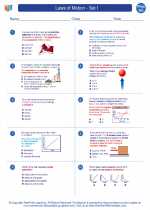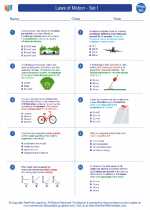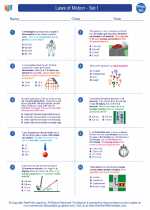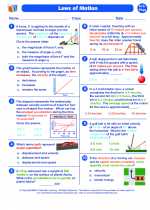Mathematics in High School Physics
Mathematics is an essential tool for understanding and solving problems in physics. It provides the language and framework for describing the physical world and making quantitative predictions. In high school physics, students will encounter several mathematical concepts that are fundamental to understanding the principles of physics.
Key Mathematical Concepts in High School Physics
- Algebra: Solving equations, manipulating variables, and understanding the relationships between quantities.
- Trigonometry: Understanding angles, sine, cosine, and tangent functions, and their applications in analyzing vectors and periodic motion.
- Calculus: Basic concepts such as derivatives and integrals, particularly in the context of velocity, acceleration, and the area under curves.
- Geometry: Understanding spatial relationships, shapes, and the application of geometric principles in problems involving motion, forces, and optics.
- Statistics and Probability: Analyzing data, making predictions, and understanding the likelihood of certain outcomes in the context of physics experiments and observations.
Study Guide for Mathematics in High School Physics
Here are some tips for mastering the mathematical concepts in high school physics:
- Practice Algebra: Work on solving equations, simplifying expressions, and understanding the concepts of variables and constants. Algebra is used extensively in physics to describe relationships between physical quantities.
- Master Trigonometry: Understand the basic trigonometric functions and their applications in physics, such as analyzing vectors, projectile motion, and simple harmonic motion.
- Understand Calculus: While high school physics may not delve deeply into calculus, having a basic understanding of derivatives and integrals can help in grasping concepts such as velocity, acceleration, and the area under curves.
- Visualize Geometry: Develop a strong intuition for spatial relationships and the application of geometric principles in physics. Visualization can be particularly useful in problems involving optics, motion, and forces.
- Practice Data Analysis: Familiarize yourself with statistics and probability concepts, as they are essential for analyzing experimental data and making predictions in physics experiments.
- Apply Mathematics to Physics Problems: Work on physics problems that require the application of mathematical concepts. This will help reinforce your understanding and demonstrate the practical relevance of mathematics in physics.
By mastering these mathematical concepts and applying them to physics problems, you will develop a strong foundation for understanding the quantitative aspects of physics and be well-prepared for more advanced studies in the subject.
.◂Physics Worksheets and Study Guides High School. Laws of Motion - Set I
Worksheet/Answer key Laws of Motion - Set I
Laws of Motion - Set I  Worksheet/Answer key
Worksheet/Answer key Laws of Motion - Set I
Laws of Motion - Set I  Worksheet/Answer key
Worksheet/Answer key Laws of Motion - Set I
Laws of Motion - Set I  Worksheet/Answer key
Worksheet/Answer key Laws of Motion - Set I
Laws of Motion - Set I 

 Worksheet/Answer key
Worksheet/Answer key
 Worksheet/Answer key
Worksheet/Answer key
 Worksheet/Answer key
Worksheet/Answer key

The resources above cover the following skills:
PHYSICAL SCIENCE (NGSS)
Energy
Students who demonstrate understanding can:
Develop and use models to illustrate that energy at the macroscopic scale can be accounted for as either motions of particles or energy stored in fields.